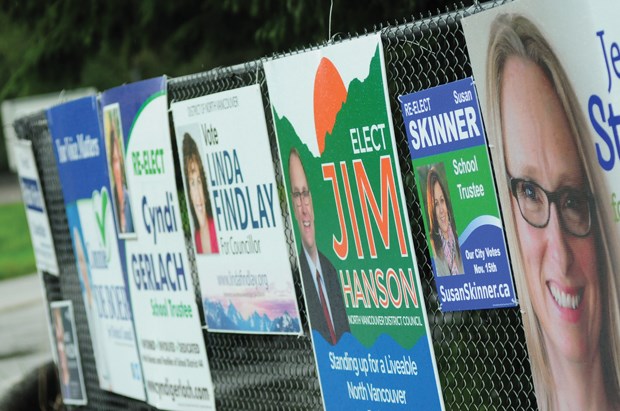The 13 candidates vying to serve on the District of North Vancouver's next council agreed to disagree at a Capilano University debate Tuesday.
The provincial and federal governments have abandoned creating affordable housing, according to Wayne Hunter. "We're literally on our own," he said, calling for a housing commission to help establish rent tethered to income.
Affordability is not the domain of municipalities, Coun. Robin Hicks explained. "We are forced into this area because we live with the consequences of people who can't afford to live here," he said.
Hicks and Coun. Doug MacKay-Dunn disagreed on the role of developers in creating lower-cost housing.
Several student-housing proposals have failed because condominiums are more lucrative, according to Hicks.
Besides providing a revenue stream for developers, rental apartments are an alternative to the "glut of condos" selling on the North Shore, argued MacKay-Dunn.
The district can forge deals with non-profits similar to the arrangement with Turning Point alcohol treatment centre, which leases municipal land for $1 per year, according to MacKay-Dunn.
The district should investigate tax breaks for homeowners who offer student suites, said Connie De Boer.
While the community may not want more development, providing housing and education today may save money tomorrow, she said.
Creating affordable housing is hampered by exorbitant land values, explained Coun. Lisa Muri.
"The change in the zoning and the density is pushing the value of the land up and that makes it impossible to create affordable housing."
Instead of creating affordable housing, the district's densification strategy has become "a wealth creation tool for single-family homeowners," according to Hazen Colbert.
Co-op housing on district-owned land for students, first-time buyers and seniors may be the answer, according to Colbert.
The district's practice of trading density for rental units should stop, according to Glenn MacKenzie. "We're paying for it in incredible congestion."
Legislating affordable housing is rife with complications, according to Kevin Macauley. "Land is not something that we have plenty of that's available just to give away, so it's going to remain a challenge for students."
The district can provide student housing, according to Wayne Hunter. "If we can own and operate a golf course, we can certainly own and operate student housing."
Lane houses near Capilano University and Phibbs Exchange could help assuage the dearth of affordable housing, according to Amelia Hill.
The all-candidates discussion was separated by a thin wall from a simultaneous City of North Vancouver debate. For amalgamation proponents, the time has come to tear down that wall.
Having two neighbouring municipalities duplicate services is silly, according to Glenn MacKenzie. His statement elicited applause from amalgamation proponent MacKay-Dunn.
Without a united North Shore front, the District of North Vancouver will continue to get short shrift from senior levels of government, according to Kevin Macauley.
Much of the debate centred around bringing more transit to North Vancouver.
"We need massive investments in rapid transit," said Jim Hanson. "The economic and social benefits of transit are overwhelming."
Hanson supported a shuttle from Phibbs Exchange to Capilano University.
North Vancouver's transit problem is exacerbated by TransLink, which Hanson and Muri agreed is "broken."
Transit is at a critical point, according to Matthew Bond.
"There's a growing realization in the industry that business as usual is no longer an option," he said.
The proliferation of traffic gridlock is largely the fault of the current council, according to Len Laycock.
"If you return those people you can expect more traffic congestion," he said. "We can't build our way out of it."
Other major cities suffer through worse traffic, pointed out Robin Hicks.
"Our road crisis is nothing compared to London, Tokyo, China, Shanghai, etc., but we can learn lessons," he said.
Major projects are underway, including an overpass at Mountain Highway and the Keith Road extension.
Laycock derided the efficacy of the Keith Road Extension. "It's going to make no difference at all. That money is going to be spent and it's going to be flushed down the toilet," he said.



